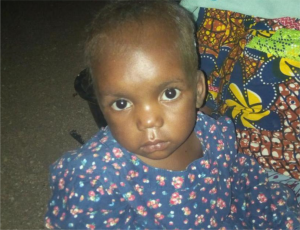North East Nigeria - providing essential health intervention in hard-to-reach communities one step at a time
Maiduguri, 19 February, 2022 - Relieved and smiling, Hassana Isa recounts the ordeal her daughter (Fatima), had to go through in the past months. Two years old Fatima living in the Kwaya-kusar Local Government Area, with her parents in Borno State was ill and frail, when she was identified malnourished by a team of mobile health care services providers carrying out health intervention in the locality.
"I knew something was wrong with her health and growth but I couldn’t do anything to make it easy. The humanitarian crisis had affected my family and displaced us from our home. We struggle to survive as we have very little to eat. If I had the means, I would have shielded her from this ordeal. Her birth brought joy to my family and she was my little beautiful baby girl” says Mrs Isa.
For some weeks, Fatima had been unwell and had looked smaller than her age. With each passing day, Fatima became weaker and neighbors advised her parents to seek treatment at the Maternal Newborn and Child Healthcare (MNCH) intervention supported by the WHO, where integrated nutrition services are provided.
Due to the humanitarian crisis, the World Health Organization mobile health care hard-to-reach team supports three states, Adamawa, Borno and Yobe in hard- to-reach and inaccessible locations in the states as well as Internally Displaced Persons (IDPs).
The mobile hard-to-reach teams consist of professional midwives, community health extension workers, and health record assistants. Their operations include; profiling of selected settlements and communities, visiting the selected communities, providing routine immunization services, treating minor ailments including acute respiratory infections, nutritional screening, and household best practices
“Fatima was one of the children who benefitted from the intervention provided by the mobile hard-to-reach (MHTR) teams. When Fatima was brought in by her parents during the MNCH session, she was severely malnourished. After a series of medical consultations, she was diagnosed with severe acute malnutrition (SAM) with medical complications, says Mrs Hadiza Musa, member of the mobile health hard-to-reach team in Kwaya-Kusar,
“We are glad to have identified Fatima’s case because it availed her the opportunity to get the needed help. With the mantra, no child ought to die due to health complications, Fatima has since begun treatment and is on the path of recovery, says Mrs Musa
Intervention outcome:
With referral from the MNCH team, Fatima was admitted at Wawa Primary Health Care Outpatient Therapeutic Program (OTP) center.
However, due to the peculiarity of her case, she was referred to a stabilization Center for in-patient management of severe acute malnutrition with medical complications in Umaru Shehu Stabilization center, in the capital city (Maiduguri) of Borno state.
Her medical condition needed to be stable first so that we can handle her nutritional rehabilitation. All efforts proved worthy as Fatima’s case improved tremendously within one month of treatment, says Mrs Musa.
As at when Fatima was discharged from the hospital, she had gained almost 30% weight increase, which was also attributed to the series of follow-ups from the team.
With funding support from the Nigeria Humanitarian Fund (NHF); the mobile health teams continue to provide urgently needed health interventions to the underserved in hard-to-reach locations across Borno, Adamawa, and Yobe states and from January to December 2021 almost 800,000 clients were treated and more than 1m children immunized against preventable diseases.
In the north east Nigeria, Borno, Adamawa and Yobe are three states affected by the ongoing humanitarian crisis, one in every five children is severely malnourished. Malnutrition, is responsible either directly or indirectly, for 35% of deaths among children under five.
